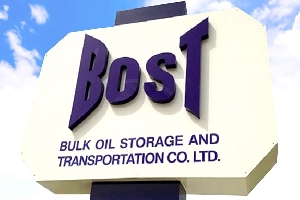 Bulk Oil Storage and Transportation
Bulk Oil Storage and Transportation
The Bulk Energy Storage and Transportation Company Limited (BEST), formerly BOST, would have recorded a profit of GH¢1 billion but had to lower its margins as a result of the pressures of the Russia-Ukraine war and the COVID-19 pandemic, Managing Director Edwin Alfred Provencal has said.
Last year, BEST posted a profit of GH¢208 million – about a fifth of its projection.
“Inadvertently, if you look at the amount of business we did in 2023, we should have made a profit of over GH¢1 billion but because of the interventions, we had to suppress our margins and others to ensure that the national problem was solved,” he explained.
Contrasting BEST’s performance with the previous year’s, Dr Provencal pointed out in a Citi FM interview: “In 2022, there was no gold-for-oil, no external shocks, no Russia-Ukraine War, and no IMF; but in 2023, we started feeling the effects of these, and the government had to intervene by leveraging institutions it could control.”
In 2023, BOST won accolades from Vice President Mahamudu Bawumia for its sterling performance among the state-owned enterprises.
Opening the new head office for the then-Bulk Oil Storage and Transportation Company Limited (BOST) in Accra on Wednesday, 15 March 2023, Dr Bawumia said: “I was delighted when I was informed that for the first time in ten years, BOST made a profit of GH¢163 million in 2021. It is evident that the turnaround of BOST has taken root.”
Established in 1993, BOST operated mainly as a monopoly in the petroleum products storage and sales business until 2004 when the Government liberalised the sector by introducing privately owned Bulk Distribution Companies (BDCs).
At some point in its history, despite its wide geographical presence across the country, with assets such as storage facilities, pipelines and marine infrastructure, BOST could not fulfil its mandate due to several reasons, including the freezing for almost a decade of the BOST margin, intended for developing, operating and maintaining the company’s storage and transmission infrastructure.
This resulted in a lack of investment in the maintenance and upgrading of the infrastructure.
Furthermore, inadequate management systems and corporate governance led to significant operational losses recorded by the company.
The records indicate that as of 2017, BOST was saddled with trade liabilities of US$624 million, legacy loans of GH¢284 million, BDC claims of US$37 million, CAPEX liability of US$109 million and GRA tax liability of GH¢47million.
Additionally, 30% of BOST tanks had been decommissioned, with 3 out of the company’s 6 depots non-operational; 4 river barges were out of commission; the total network of pipelines (361 km) across the country was out of service and 77 kilometres of 12-inch pipes, procured under a US EXIM facility, had been detained in Houston for over 10 years as a result of contractual disputes.
BOST’s accounts had also been unaudited for 3 years, making it difficult to determine the company’s financial position.
However, through the proactivity and major reforms undertaken by the present Board and management, Dr Bawumia noted: “I must say, and it deserves to be said loudly, that BOST is now a shining example of an effectively run state-owned enterprise.”
He continued: “I am delighted to state that between 2017 and now, 13 out of the 15 defective tanks have been repaired, all 4 river barges have been fixed, all pipelines which were out of service have been repaired while obsolete pumps, meters, and loading arms have been replaced at BOST depots”.
“The result has been an increase in the utilisation of BOST’s revenue-generating assets from 34% in 2019 to its current level of 97%”.
“The increase in the BOST margin, from 3 to 6 pesewas per litre in 2019 and subsequently to 9 pesewas in 2020, has contributed significantly to the execution of these projects”.
“The turnaround of the business is significant, and this is demonstrated by the improved operational efficiency,” he noted.
